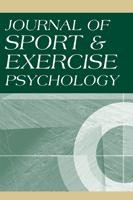Journal of Sport & Exercise Psychology.

Volume 29, Issue 6 (December 2007)
Predictors of Poor Sportspersonship in Youth Sports: Personal Attitudes and Social Influences
David L. Shields, Nicole M. LaVoi, Brenda Light Bredemeier, F. Clark Power
pages 747-762
Goal Striving, Goal Attainment, and Well-Being: Adapting and Testing the Self-Concordance Model in Sport
Alison Smith, Nikos Ntoumanis, Joan L. Duda
pages 763-782
Exercise Psychology
Cross-Lagged Relationships Among Leisure-Time Exercise and Perceived Stress in Blue-Collar Workers
Rafer S. Lutz, Marc R. Lochbaum, Beth Lanning, Lucinda G. Stinson, Ronda Brewer
pages 687-705
Exercise Makes You Feel Good, But Does Feeling Good Make You Exercise?: An Examination of Obese Dieters
Robert A. Carels, Carissa Coit, Kathleen Young, Bonnie Berger
pages 706-722
Resistance Training and Older Adults' Beliefs About Psychological Benefits: The Importance of Self-Efficacy and Social Interaction
Rylee Dionigi
pages 723-746
The Digest
The Digest
pages 792-799
Author Index
Author Index and Guest Reviewers
pages 800-808
Research Notes
Exercise and Working Memory: An Individual Differences Investigation
Benjamin A. Sibley, Sian Beilock
pages 783-791
JSEP, 29(6), December 2007, Copyright © 2007
Exercise and Working Memory: An Individual Differences Investigation
Benjamin A. Sibley, Sian Beilock
Abstract
In the current work we asked whether executive function, as measured by tests of working memory capacity, might benefit from an acute bout of exercise and, more specifically, whether individuals who are lower or higher in working memory to begin with would be more or less affected by an exercise manipulation. Healthy adults completed working memory measures in a nonexercise (baseline) session and immediately following a 30-min self-paced bout of exercise on a treadmill (exercise session). Sessions were conducted 1 week apart and session order was counterbalanced across participants. A significant Session X Working Memory interaction was obtained such that only those individuals lowest in working memory benefited from the exercise manipulation. This work suggests that acute bouts of exercise may be most beneficial for healthy adults whose cognitive performance is generally the lowest, and it demonstrates that the impact of exercise on cognition is not uniform across all individuals.
1 comentario
Jordan Spizikes -